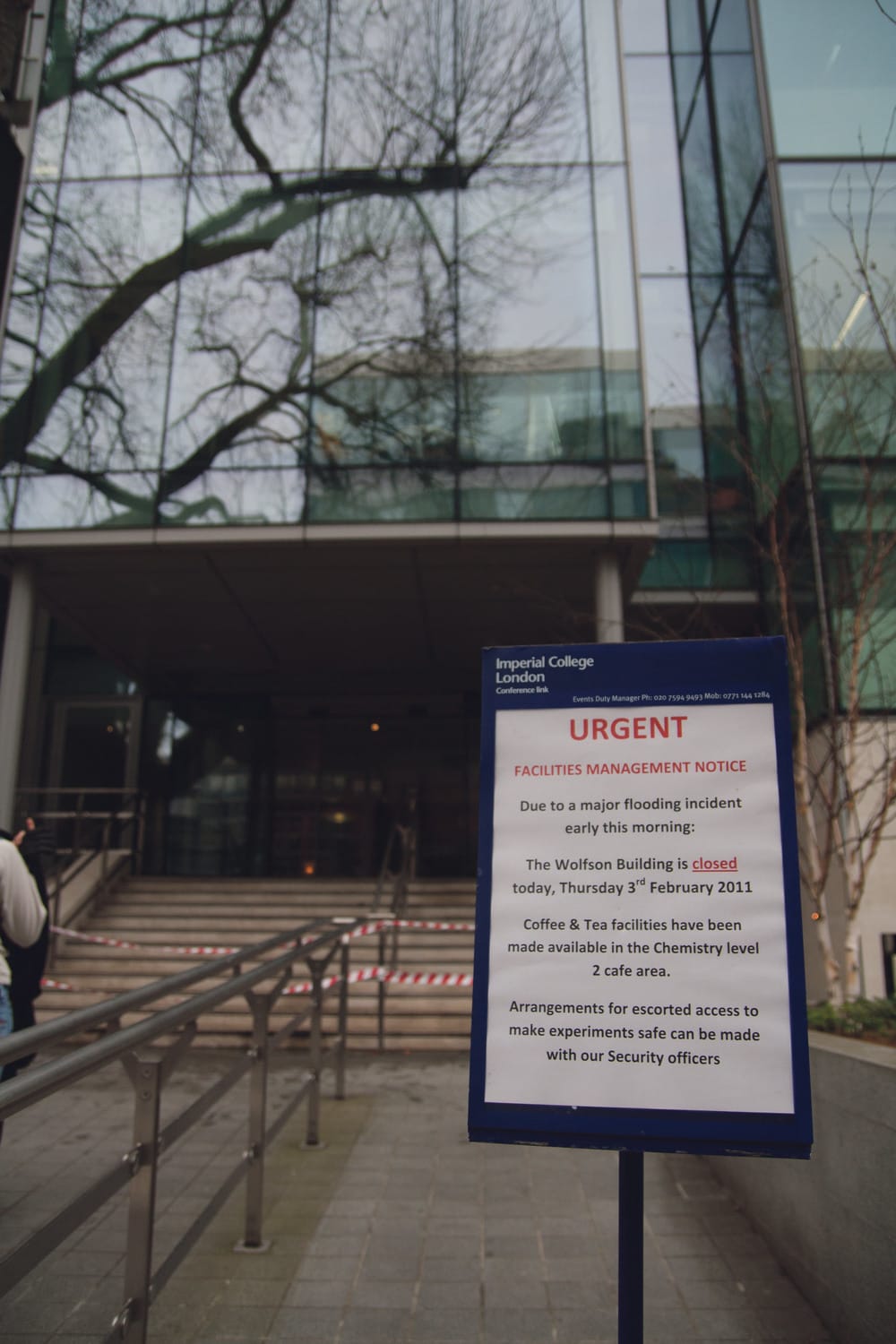Major flooding shuts Biochemistry
Pipe connection failure sends water gushing down through Biochemistry building

The Biochemistry building has been hit with two serious floods this past week. A failure of a pipe connection to a rooftop water tank is believed to have caused the flood on Thursday morning while a suspected valve failure, or pump malfunction, caused a 6ft flood of water in the sub-basement during the weekend.
It is not yet known whether the two events are linked but Director of Facilities and Property Management Nick Roalfe told Felix that it was possible that the interrupted flow of water from the weekend flood had applied extra strain on the pipe connection. However, he emphasized that they could not be certain until the cause had been properly investigated. The Biochemistry building was closed on Thursday but the majority of the building is hoped to be re-opened by the morning of Friday the 4th.
Thursday’s flood is believed to have sent hundreds of gallons of water cascading down into the Biochemistry building leaving the top four floors of the building most badly affected and several centimetres of standing water in parts of the building.
Students were first alerted via the Imperial website at approximately 9am. In an email to Department of Life Sciences staff and Postgraduate Research students, Professor Paul Freemont said that some instrument rooms had been hit badly but that it appeared “most of the very expensive pieces of kit” had been spared. He said that the flood was a “major blow” but praised Estates for doing a “great job”.
The flooding disrupted the fire alarm systems in both the Chemistry and Biochemistry building, forcing Mr Roalfe to close down both buildings due to safety concerns. The Chemistry building was reopened by approximately 9am after the fire alarm system was restored there.
At the beginning of the week the Biochemistry and Chemistry buildings were left with reduced water supplies earlier this week after another flood during the weekend left damage to the Biochemistry basement.
A 6ft flood of water in a Plant Room in the Biochemistry basement forced Facilities management to shut down the water supply to the Biochemistry building as well as the neighbouring Chemistry Department.
Although the water was quickly pumped out, further disruption was caused by damage to electrical control panels in the affected Biochemistry Plant Room, leaving hot water unavailable in the Biochemistry building and no water for toilets and laboratories in buildings C1 and C2 of the Chemistry Department until Tuesday.
The lack of water led the Department of Chemistry to shut all labs and forcing the cancellation of laboratory classes and the suspension of research activities on Monday. Head of the Department of Chemistry Professor Tom Welton explained to Felix that the labs were shut because some experiments require water to run but also due to safety reasons; a ready supply of water is needed in case of spillages and other emergencies.
Out of the five pumps previously operating in the Biochemistry Plant Room, only one was working on Tuesday. The overall extent of the damage has not been revealed, however, Buildings Manager Anna McDadd admitted in an email to staff that it “may be a while before the extent of the damage to pumps, motors and other plant is realised.”
With regards to impaired student work resulting from the closed laboratories, Professor Welton confirmed to Felix that anyone whose work has been affected will have this taken into account, stating as an example that marks for undergraduate labs sessions will be adjusted accordingly if necessary. Discussing the aid received during and after the flood, he praised the work of the Facilities Management team, remarking that they responded quickly to address the problems and “have been nothing but helpful”.
Nick Roalfe admitted that it had been a very difficult week and said that he was determined to have the buildings reopened and fully operational as quickly as possible. He thanked Departmental staff for their support and added that on Monday and Tuesday he and his team would having a full review of the floods and their responses to the flooding. He was particularly keen to investigate how they could communicate more quickly and efficiently with students to let them know about possible disruption to their schedules.









